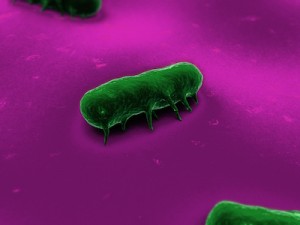A Salmonella Infantis outbreak in Canada has sickened at least 98 people, according to the Public Health Agency of Canada. The outbreak is linked to raw poultry products.
 Interviews of sickened individuals indicate that some illnesses were caused by improperly handling and repackaging raw poultry products. Others reported eating different brands and types of chicken. A sample of raw chicken taken from the home of a sick person has tested positive for the outbreak strain of Salmonella Infantis.
Interviews of sickened individuals indicate that some illnesses were caused by improperly handling and repackaging raw poultry products. Others reported eating different brands and types of chicken. A sample of raw chicken taken from the home of a sick person has tested positive for the outbreak strain of Salmonella Infantis.
Salmonella is commonly found in raw poultry. In fact, a study last year by Consumer Reports found that 97% of the chicken breasts they purchased from grocery stores and tested were positive for the pathogenic bacteria.
The outbreak case count by province is: British Columbia (7), Alberta (12), Saskatchewan (2), Manitoba (2), Ontario (57), Quebec (14) Nova Scotia (2), Prince Edward Island (1) and New Brunswick (1). People became sick between March 15, 2015 and December 12, 2015. Most of those sick are female. The average patient age is 40 years. Sixteen people have been hospitalized in this outbreak. No one has died.
To avoid getting sick, you should take care when handling raw poultry products. Always wash your hands well with soap and water before and after handling food products, especially raw meats. Always cook poultry to a safe internal temperature and check it using a reliable food thermometer. Poultry pieces should be cooked to 165°F and whole poultry should be cooked to 170°F.
Never rinse poultry before you use it. Rinsing can aerosolize the bacteria and it can move three feet from the kitchen sink. Water splashes can also create a safety hazard.
Clean knives, cutting boards, utensils, countertops, and any appliances or pans that may have come into contact with raw poultry using warm soapy water. Cleaning items that can be cleaned in the dishwasher is a good way to sanitize them.
Symptoms of a Salmonella infection include fever, chills, diarrhea, abdominal cramps, headache, nausea, and vomiting. People usually get sick six to seventy-two hours after infection. Most people are sick for four to seven days, and most recover without medical attention. Some people, especially those in high risk groups such as children, the elderly, and those with compromised immune systems, may become so ill they must be hospitalized.
And remember that people who have a Salmonella infection can be infectious several weeks after they recover. And some people can be infected and not display any symptoms. These people can spread the illness to others. If you have been sick with a diarrheal illness, do not prepare food or serve food to others for several weeks to be safe.




